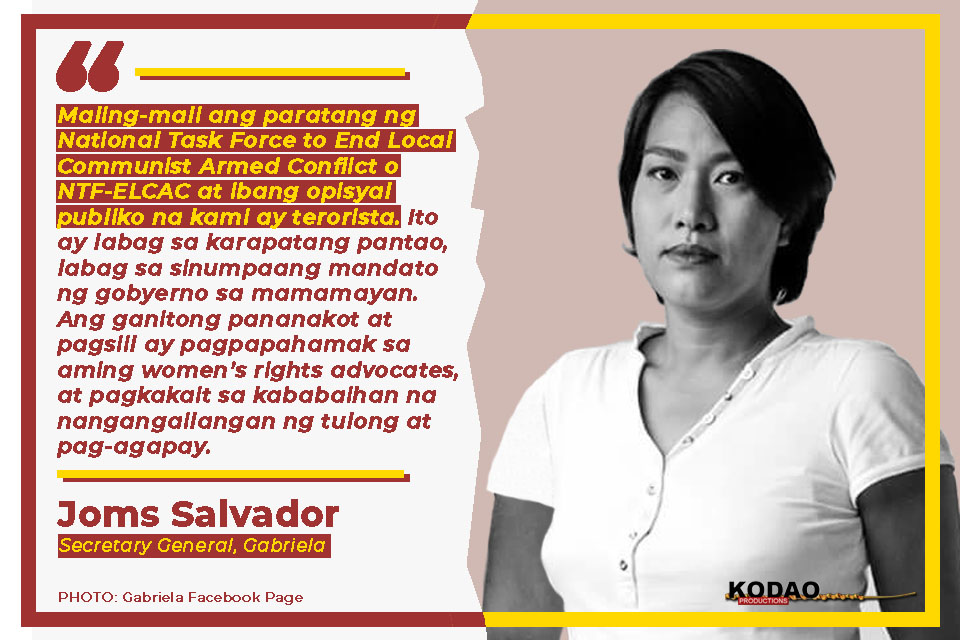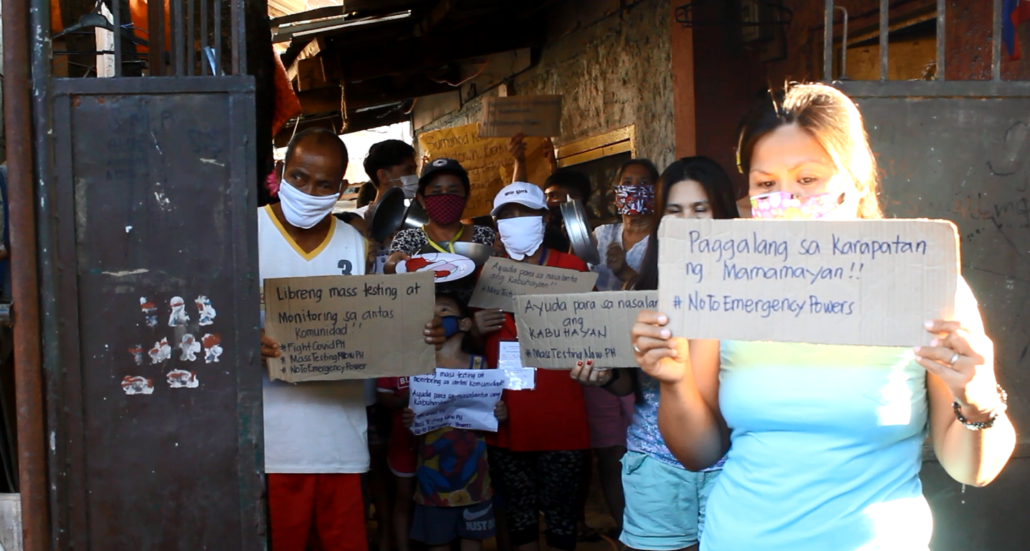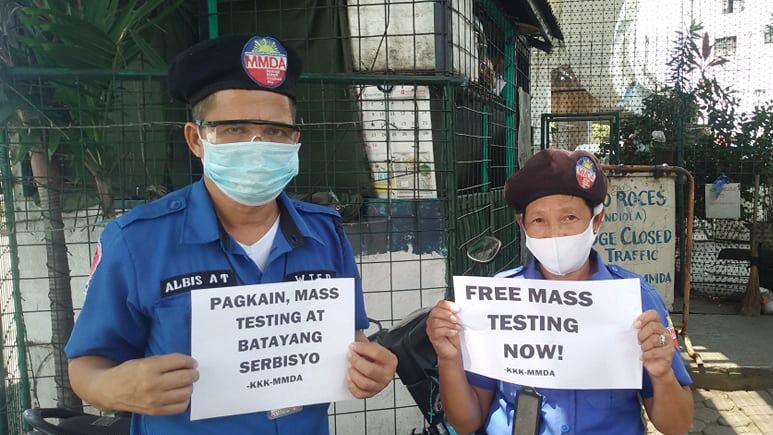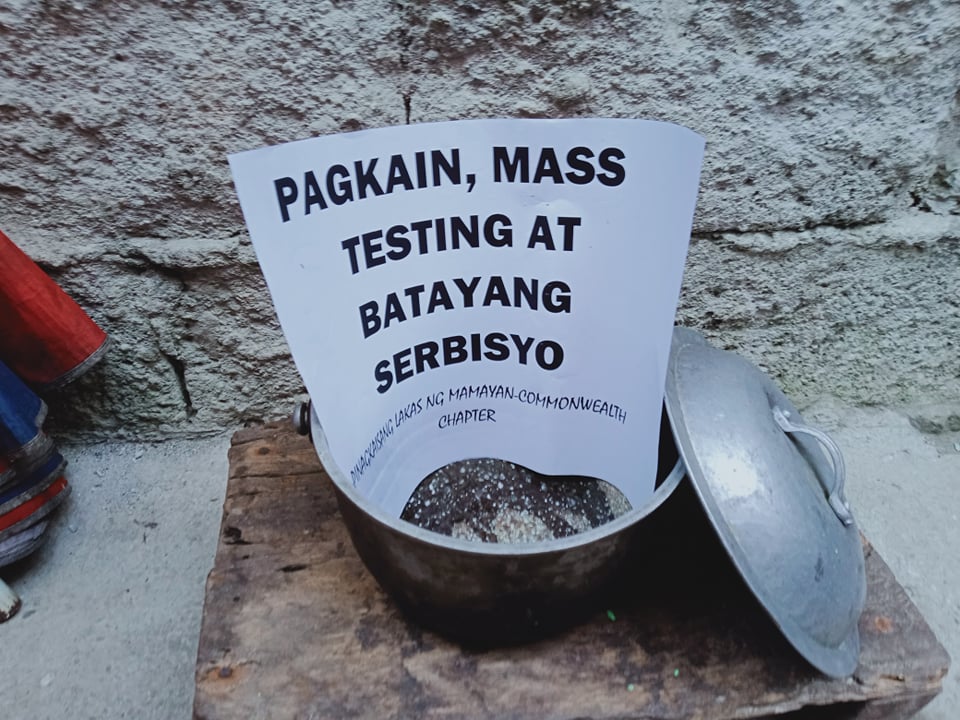Ni Joseph Cuevas
Tumindi ang krisis ng pandemyang Covid-19 dahil sa simula pa lamang ay minaliit na ni Pangulong Rodrigo Duterte ang epekto nito sa bansa na naging militarista naman ang naging pagtugon ng gobyerno noong nanalasa na ito kalaunan.
Ito ang sumada ng mga kinawatan sa blokeng Makabayan sa isang online forum noong Sabado, May 23, na pinamagatang “Hatol Makabayan”
Inihayag ni Makabayan Chairman Atty. Neri Colmenares sa kanyang pambungad na pananalita na tumindi ang krisis ng pandemyang Covid-19 sa Pilipinas dahil sa simula ay minaliit na ito ni Pangulong Duterte at hindi kaagad gumawa ng karampatang aksyon.
Sinabi naman ni Rep. Sarah Elago ng Kabataan Party na hindi solusyong medikal ang unang naging hakbang ni Pangulong Duterte, bagkus ay isang militaristang Enhanced Community Quarantine (ECQ) o lockdown.
Imbes anila na mass testing, isolation, tracing at treatment sa mga posibleng maysakit ay tinapatan ang unang pagdami ng kaso ng coronavirus ay nagpatupad ito ng malupit na lockdown, bagay na ikinabahala ng United Nations Human Rights Council.
Para naman kay ACT-Teachers Rep. France Castro, nakakabahala ang sitwasyon ng mga frontliner dahil sila ang sumusuong sa panganib ng pandemya.
Kulang na kulang ang mga doktor, nars, medical staff pati na din sa mga itinatayong testing centers at kagamitan tulad ng Personal Protective Equipments, dagdag ni Castro.
Kalunos-lunos din ang kalagayan ng mga pampublikong ospital at isolation center para sa mga Overseas Filipino Workers na umuwi sa bansa.
Sa ngayon nasa 13,577 ang kaso ng Covid-19 kung saan mahigit 863 na ang nasawi at mayroong backlog na halos 6,000 na mga pinaghihinalaang kaso ng sakit.
Ang Pilipinas ang may pinakamahigpit at pinakamahabang lockdown sa buong mundo na umabot na sa mahigit 70 araw.
Ang online forum ay pinangunahan ng mga mambabatas mula sa Bayan Muna, ACT-Teachers, Gabriela Women’s Party at Kabataan party.
Pasismo sa pandemya
Ayon kay Gabriela Women’s Party Rep. Arlene Brosas ang militaristang tugon ng gobyerno para labanan ang Covid-19 ay nagdulot ng 177, 540 na pag-arestosa panahon ng lockdown na umaabot ng average na 2,900 kada araw at higit 52,000 na ikinulong.
Ilan sa mga ito ang ginawang pag-aresto at pagkulong sa mga relief worker ng Tulong Anakpawis sa Bulacan noong Abril 26 at Lingap Gabriela sa Marikina at Tulong Kabataan sa Quezon City noong Mayo 1.
Dagdag pa ni Brosas, dahas din ang naging tugon katulad nang pagpaslang kay Jory Porquia ng Bayan Muna sa Iloilo at pagpatay sa isang dating sundalo na lumabag umano sa quarantine sa Quezon City. Hindi rin nito pinaglagpas ang ilang netizen sa Online Tokhang tulad ng ginawa sa isang guro sa Zambales.
Wala ring tugon ang gobyerno sa planong magpalaya ng mga bilanggo na kumakalat na ang sakit sa mga kulungan. Hanggang ngayon, wala pa ring tugon ang petisyon na inihain ng mga kaanak ng political prisoner sa Korte Suprema sa halip ay tinutulan pa ito ng Office of the Solicitor General, pahayag pa ni Brosas.
Tinalakay naman ni Rep. Eufemia Cullamat ng Bayan Muna na bukod sa pasistang pananalakay sa mamamayan ay walang humpay din ang counter-insurgency na atake ng gobyerno.
Ilan na dito ang naitalang pambobomba at pagkakampo sa ilang komunidad ng mga katutubo sa CARAGA region, pag-aresto sa mga lider ng progresibong grupo at kaso ng red-tagging, maging pekeng pagpapasurender.
Kapos na ayuda at lumolobong badyet
Naging tampok din sa forum ang tugon ng gobyerno sa kabuhayan ng mamamayan. Inilarawan ni Rep. Ferdinand Gaite ng Bayan Muna ang programang Social Amelioration Program o SAP ng gobyerno na makupad dahil sa napakabagal at burukratikong proseso nang pamamahagi nito.
Ayon kay Gaite, nasa apat na milyong Pilipino pa ang hindi nakatanggap ng nasabing ayuda mula sa target nitong 18 milyon. Maging ang tulong para mga manggagawa ay napakabagal din.
Nasa tatlong milyong manggagawa lamang ang ayuda ng DOLE na Covid-19 Adjustment Measures Program o CAMP mula sa tinatayang 10 milyon na apektado sa buong bansa.
Pinuna naman ni Rep. Carlos Zarate ang napakalaking pondo na nakalaan para sa pandemya subalit hindi naramdaman ng taumbayan.
Kabilang na dito ang halos P275 bilyon na pondo ni Pangulong Duterte kahit pa umutang ito nang aabot sa $5 bilyon mula sa iba’t-ibang multi-lateral agency tulad ng World Bank at Asian Development Bank.
Itinutulak pa aniya ang mga bagong panukala sa Kongreso na “stimulus program” tulad ng Enhanced Build Build Build na magpapasidhi ng patakarang neoliberalisasyon sa ekonomiya, ani pa Zarate.
Nagbigay reaksyon naman ang iba’t-ibang grupo kabilang na dito ang mga mungkahi at panukala na:
– ng health care system sa bansa at paglalalan ng malaking pondo rito hindi lamang sa panahon ng Covid-19.
-Re-alignment ng pambansang badyet sa mga ahensya at mga target na pagkukunan kabilang na ang mataas na pagbubuwis sa mga mayayaman at malalaking korporasyon.
-Direktang ayuda sa mga manggagawa na apektado at pagbibigay trabaho sa mga natanggal kabilang na ang mga kontraktwal at job-order.
-Production subsidy at direct cash assistance na P10,000 sa mga magsasaka, mangingisda at maralita sa kanayunan.
-Pagbibigay ng SAP kahit sa panahon ng GCQ o General Community Quarantine at kabuhayan sa mga maralita.
-Paggiit sa “No Mass Testing, No School Opening” para naman sa mga kabataan at guro sa pagbubukas ng klase sa darating na Agosto at
-Pagpapatigil sa mga dagdag bayarin at pagpapahirap sa mga estudyante tulad ng Online Classes.
Sa huli, binigyang-hatol ng Makabayan at batayang sekor na maraming kapalpakan, kasalanan at kamalian ang gobyerno ni Pangulong Duterte sa pagharap sa Covid-19.
Hinikayat nila ang mamamayan na kumilos at marapat na paigtingin ang panawagan para sa Kalusugan, Kabuhayan at Karapatan. #









